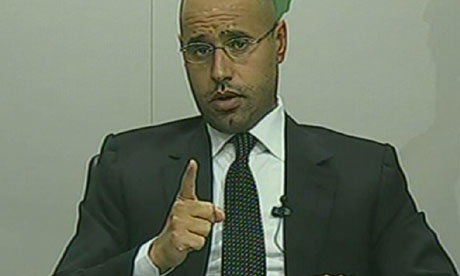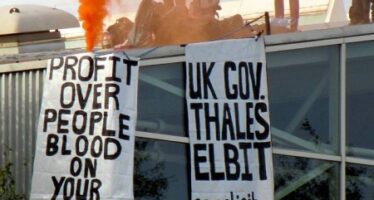Libya on brink as protests hit Tripoli
![]()
Muammar Gaddafi’s son warns of civil war in state television address as regime tries to halt uprising
Ian Black, Middle East editor

Saif al-Islam Gaddafi on Libya’s state television station. He warned of civil war unless order is restored. Photograph: AFP/Getty Images
Muammar Gaddafi’s son went on Libyan TV to defend his father’s 41-year rule of Libya as protests spread to the capital Tripoli.
The most violent scenes so far of the wave of unrest sweeping the Arab world were seen as Gaddafi relied on brute force to crush what began last week as peaceful protests but nowthreaten his regime.
After a bloody crackdown that saw troops and mercenaries shooting unarmed demonstrators in the country’s second city of Benghazi, the death toll rose to more than 230.
BBC Arabic reported automatic gunfire and teargas in the capital for the first time since the unrest began.
But the regime went on the attack when Saif al-Islam appeared on state TV to say it was a “tragedy” that Libyans had died but warned of “civil war” unless order was restored.
“There is a plot against Libya,” said Saif, blaming “an Islamic group with a military agenda” for the bloodshed in Benghazi.
Libya would see “rivers of blood”, an exodus of foreign oil companies and occupation by “imperialists” if the violence continued, he said.
In reality, there has been little sign of Islamist involvement in Libya’s unprecedented unrest. Nor was there in the uprisings in Tunisia or Egypt.
In a rambling speech Saif al-Islam repeatedly said Libya was “not Egypt or Tunisia”, neighbouring countries whose leaders were swept from power in recent weeks.
“Muammar Gaddafi, our leader, is leading the battle in Tripoli, and we are with him,” Saif al-Islam said.
“The armed forces are with him. Tens of thousands are heading here to be with him. We will fight until the last man, the last woman, the last bullet.”
Wagging a finger at the camera, he blamed Libyan exiles for fomenting the violence but also promised dialogue on the country’s constitution, saying that the general people’s congress, Libya’s equivalent of a parliament, would convene to discuss a “clear” reform agenda, while the government would also raise wages.
In fast-moving developments after midnight, demonstrators were reported to be in Tripoli’s Green Square and preparing to march on Gaddafi’s compound as rumours spread that the leader had fled to Venezuela. Other reports described protesters in the streets of Tripoli throwing stones at billboards of Muammar Gaddafi while police used teargas to try to disperse them.
“People are in the street chanting ‘Allahu Akbar’ (God is great) and throwing stones at photos of Gaddafi,”an expatriate worker told Reuters by telephone from Tripoli. “The police are firing teargas everywhere, it’s even getting into the houses.”
Libya’s extraordinary day overshadowed drama elsewhere in the region. Tensions eased in Bahrain after troops withdrew from a square in Manama occupied by Shia protesters. Thousands of security personnel were also deployed in the Iranian capital, Tehran, to forestall an opposition rally. Elsewhere in the region unrest hit Yemen, Morocco, Oman, Kuwait and Algeria.
But the eyes of the world were on Benghazi and elsewhere in eastern Libya where shocked witnesses spoke of “massacres” and described corpses shot in the head, chest or neck piling up in hospitals running short of blood and medicines.
According to a Reuters report, Libyan soldiers said they had defected and were joining the protests.
An intelligence source reported that 150 soldiers and officers who disobeyed orders and refused to shoot at protestors would be executed.
Estimates of the total number of fatalities over six days of unprecedented unrest ranged from 233 – the latest figure given by Human Rights Watch – to 285. But some opposition sources gave figures as high as 500.
Two of Gaddafi’s other sons, Khamis and Saadi, and intelligence chief Abdullah Sanussi were reportedly commanding efforts to crush the protests in Benghazi, where buildings were ransacked and troops and police forced to retreat to a compound to pick off demonstrators with sniper and artillery fire.
As-Sharq al-Awsat, the Saudi newspaper, quoted sources close to the Gaddafi family as saying they would “die on Libyan soil” rather than give up power like the presidents of Egypt and Tunisia.
Facts were hard to pin down in the face of a news blackout that included jamming of the signal of the al-Jazeera TV network and interference with telephone and internet connections.
But there were multiple claims of the army firing into crowds and the targeting of mourners at the funerals of those killed on Saturday.
The Libya al-Yawm news website quoted one local doctor as saying that 285 people had died in Benghazi alone.
“Now people are dying we’ve got nothing else to live for,” a student blogger told the Guardian.
“It’s like a pressure cooker. People are boiling up inside. I’m not even afraid any more. Once I wouldn’t have spoken at all by phone. Now I don’t care.”
In other signs of mounting domestic anger at Gaddafi, Libya’s representative to the Arab League, Abdel Monein al-Honi, announced that he was resigning in protest at the suppression of the unrest. Libya’s ambassador to China, Hussein Sadiq al-Musrati, resigned on air while on al-Jazeera Arabic, calling on the army to intervene, and urged all diplomatic staff to resign. In another striking development, the leader of a powerful tribe in eastern Libya warned that oil exports to the west – vital for the country’s economy – would be halted within 24 hours unless the authorities stopped the “oppression of protesters”.
The US, Britain and the EU expressed concern at the escalation in violence, but no punitive measures were announced. On Friday the UK revoked licences for the export of riot control equipment. Libya yesterday warned the EU it would halt co-operation over illegal immigration unless the EU stopped supporting protests.
The regime, once treated as a pariah, has been embraced by western countries hungry for oil and lucrative business opportunities since Gaddafi abandoned his support for terrorism but there has been very little easing of domestic repression.
William Hague, the foreign secretary, spoke to Saif al-Islam and “expressed alarm at reports of large numbers of people being killed or attacked by Libyan security forces … The foreign secretary strongly encouraged the Libyan government to embark on dialogue and implement reforms.” Gaddafi’s son showed few signs that he had been persuaded in the rambling TV address he gave later.
Oliver Miles, a former British ambassador to Libya, writes on the Guardian’s Comment is Free site: “Assuming that the Libyan protesters have the stamina and determination of those in Tunisia and Egypt , even in the face of gunfire, the resolution of the conflict seems to depend on two factors: will the disturbances spread to the different urban environment of Tripoli?
“And will the army – composed of Libyans, not foreign mercenaries, and therefore open to tribal influences which are largely unknown – continue to be willing to fire on unarmed civilians?”
Related Articles
Un ataque en la era de las redes sociales
![]()
Boston Martín Granovsky Página 12 Ni la trabajosa negociación en el Congreso para regular un poquititito así la venta de
Gaza war cross-examined in Scottish courts
![]()
After a gruelling fourteen day trial, a group of activists known as the Thales Ten,* received their verdict in Glasgow Sheriff Court last week. Five were convicted, and five acquitted, of the crime of breach of the peace
Americans Oppose Criminal US Syrian Attack
![]()
Obama Set to Launch it Anyway f you needed more evidence that former president Jimmy Carter was correct [1] when he said,



